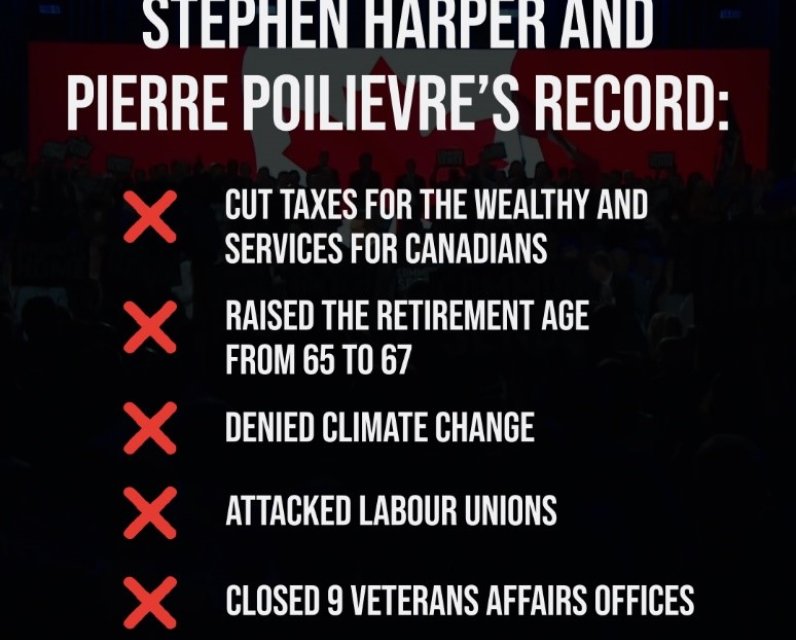Unpublished Opinions
Stefan Klietsch grew up in the Ottawa Valley outside the town of Renfrew. He later studied Political Science at the University of Ottawa, with a Minor in Religious Studies. He ran as a candidate for Member of Parliament for Renfrew-Nipissing-Pembroke three times from 2015 to 2021. He recently graduated with a Master of Arts in Political Science at the University of Carleton.
How Liberals keep swinging at and missing Poilievre's glass jaw

Liberals have taken every recent opportunity to snatch defeat from the jaws of Poilievre’s pending victory, including in this infographic from a June 21st fundraising email
It is easy to forget just how much turnover there was in the House of Commons following the 2015 federal election. The Liberals made a major increase to their seat count from 36 seats to 148 seats, resulting in an overwhelmingly rookie caucus of Members of Parliament. Keeping in mind, then, that MP candidates would tend to have more political awareness than the general Canadian population, one still must wonder if the Liberal political class has collective amnesia of the governing record of the Stephen Harper Conservatives. How else could the Liberals so utterly fail to prevent the rise of Pierre Poilievre, a politician given life primarily by the Harper government, to dominance in Canadian public opinion?
Polls are clearly telling the political class that Canadian dissatisfaction with Justin Trudeau, personally, has reached a breaking point. Arguably Trudeau’s policy choices have had some role to play in this antipathy, and the policy distinctiveness between the Liberals and the NDP has become increasingly less obvious with Jagmeet Singh’s leadership of the latter. Nonetheless, Canadians surely evaluate incumbent politicians against the imagined behaviour of the alternative options. The question is arguably not whether Poilievre has a glass jaw that can be metaphorically punched off, but the question is instead whether Liberals can even see what the glass jaw is.
Many of the Liberals’ allegations against Poilievre hint at the real problem of his politics while still being fundamentally misleading. When asked on July 3rd why Trudeau was not stepping down after a humiliating by-election defeat, Trudeau drew an implicit comparison between Poilievre and Donald Trump, saying, “If we look at the elections in the U.S. and in France, democracy across the world is under threat.” But comparisons of Poilievre to Trump here muddy the waters: we know that many Republicans privately despise Trump yet unscrupulously endorse him anyways. Those who have the misfortune to work with Trump inevitably later distance themselves from that wrecking ball of narcissism.
There is no equivalent Conservative cynicism towards Poilievre, nor is there any obvious hint of Poilievre edging his party towards personality-cult mechanics that were not already there before his leadership. And where Trump’s potential re-election poses an imminent risk to the integrity of America’s fragile institutions, a future Poilievre government merely threatens to offer a more reactive and narrow divisiveness. No, Poilievre is not going to touch abortion laws as Liberals have hinted. And compared to Alberta Premier Danielle Smith, Poilievre seems cautious about associating with far-right figures.
Poilievre’s actual glass jaw is that he is a dogmatically rigid partisan troll. That’s not a criticism of the man being in some broad sense unpleasant to Liberals, journalists, or the political class. Rather, that’s an observation of the essence of his policy worldview. The man fundamentally lacks an independent mind for sorting through partisan policy claims, more so than the leader of any other major Canadian political party. (By comparison, the other major party leaders are all too willing to spite their own partisan support bases, as I have witnessed personally from Elizabeth May, for example.)
I have seen no shortage of claims from Conservatives to the effect that Trudeau is the prime example of a “divisive” prime minister. He is certainly not a prime minister who is divisive across partisan lines in the ways that would inevitably bring a minority government to a premature end. If anything, many of the worst policies of the Trudeau government have been accompanied by too little division, with some of the worst legislation from Bill C-11 to Bill C-18 to the blanket news subsidies being supported by non-Conservative opposition parties with little fanfare. Poilievre’s Harper 2.0 majority government would instead rush through legislation while gleefully giving the middle finger to all critics from all opposition parties.
If there is anyone in the world who has been least likely to learn from the political mistakes of the Harper government, that person would be Poilievre. Aside from losing a Cabinet position in the Conservative defeat of 2015, Poilievre has never been personally liable for any Conservative losses or defeats, regardless of his enthusiastic vote in favour of the Harper government’s 100 motions for time allocation, regardless of the humiliating public last-minute backtracking in his widely panned “Fair Elections” Act, and regardless of the lack of policy daylight between himself and former defeated Conservative leader Andrew Scheer. Instead, Poilievre has been coddled by his party by being allowed to switch to a safer seat in the 2015 federal election to save his career, coddled with prominent Shadow Cabinet positions, and coddled again by being allowed to take the top party position at the interval in time when an incumbent government would usually fall to defeat.
Collective amnesia by both the Liberals and the media have allowed Poilievre to get away with pretending to be something that he demonstrably is not: a leader proud of his record. Unlike his own caucus mate Michael Chong, Poilievre is not renowned or appreciated for his work as parliamentarian, and Poilievre seems uninterested in talking about his longstanding voting record. Poilievre is instead loved and appreciated by Conservatives for all the wrong reasons: for being a dutiful sycophant who would never dare speak any ill of his own tribe’s patriarchs, for being the champion own-the-Libs smack-talker, and for reliably regurgitating all the longstanding policies that have already been popular among the conservative movement and the Conservative base.
The Liberals should in principle self-reflect on the unpopularity of their Leader, but they should also jog their memories as to why Poilievre was loathed before many of them even became MPs. The way to shame Poilievre in front of Canadians is not to look to American politics or to treat him as some kind of exotic foreign import, but rather to expose him as the blinkered made-in-Canada partisan meme-bot that he is. But Liberals seem too out-of-touch these days to see the obvious even in their chief political enemy, and they look doomed accordingly.



Comments
I'd focus on his link to the Christian right-wing or Christian Nationals in the US who are pushing Project 2025, Trump's manifesto to install a fascist government in the US. For me Poilievre represents a return to the Christian-first, anti-science, pro-oil and gas government of Stephen Harper, his mentor. The separation of church and state is imperative in a democracy. The Alberta-Conservatives, of which he represents, are more American than Canadian in my opinion and do not respect the democratic institutions of Nation. The trucker convoy attack on Ottawa made that clear.